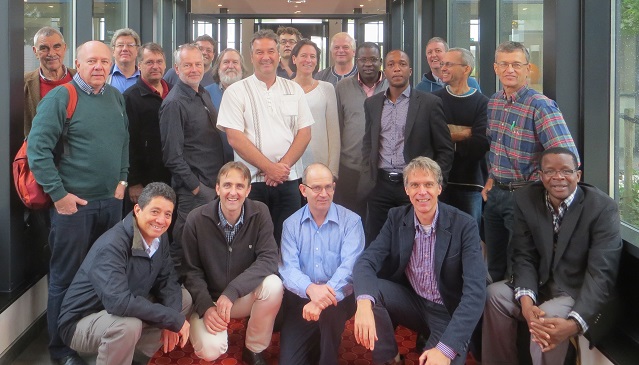RTB crops play an important role in the farm systems of smallholders in humid tropics agroecosystems, so it was just a question of time before RTB and the IITA-led CGIAR Research Program on Integrated Systems for the Humid Tropics (Humidtropics) would explore partnership opportunities. This happened in early November, in Amsterdam, at a meeting that brought together participants from both research programs and invited experts from others. Read the report
Humidtropics, which was launched a year ago, aims to help poor farm families in tropical Africa, Asia and the Americas to boost their income from integrated agricultural systems’ intensification while preserving their land for future generations. The research program shares many priorities with RTB, such as engaging farmers, value chain actors and a broad array of partners, mainstreaming gender, and implementing results-based management. Partnering with each other and other commodity research programs brings a series of potential benefits for RTB and Humidtropics. Firstly, it should increase the demand pull and improve the relevance of their research agendas. Secondly, it will make it possible to address trade-offs among technology options when changing a farming or livelihood system. Thirdly, it should create a space for collaboration on system-level research and learning. Fourthly, it will facilitate the inter-weaving of impact pathways across research programs, as Humidtropics can significantly expand the outreach of commodity research programs. Together, these benefits will contribute to increasing the joint-CGIAR ability to improve food and nutritional security, alleviate poverty, and preserve the integrity of natural resources.
The workshop in Amsterdam was designed to capitalize on these potential synergies and produce a practical plan for collaboration between RTB and Humidtropics. Most participants were from RTB and Humidtropics – with one participant from the MAIZE Research Program – but the lessons learned will certainly be of relevance to other commodity research programs. During the 2.5-day workshop, the participants improved their mutual understanding of each other’s flagships, theories of change and intermediate development outcomes. Using a modified ‘World Café’ format, they explored a set of key topics from three Humidtropics action areas and one global topic of systems analysis. They then divided themselves into task groups to develop the basis of collaboration plans drawing from these topics. Across these topics and action areas, it became clear that there is a continuum of possible modalities for engagement, each of which is valid under different circumstances.
The challenge during the coming months will be to build on the momentum generated by the workshop and translate its plans into practical action. One significant opportunity to do this will be through the pilots for results-based management that RTB and Humidtropics have committed to collaborating on.
